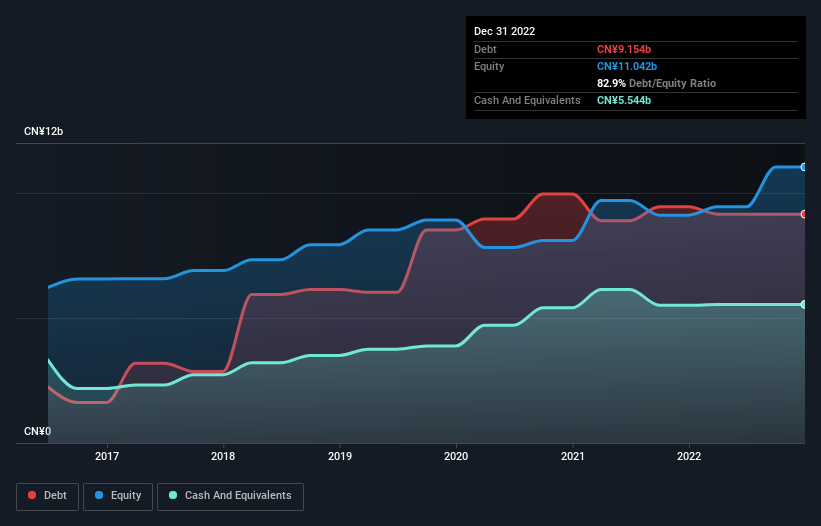
Some say volatility, rather than debt, is the best way to think about risk as an investor, but Warren Buffett famously said that 'Volatility is far from synonymous with risk.' So it seems the smart money knows that debt - which is usually involved in bankruptcies - is a very important factor, when you assess how risky a company is. We note that Luye Pharma Group Ltd. (HKG:2186) does have debt on its balance sheet. But should shareholders be worried about its use of debt?
What Risk Does Debt Bring?
Generally speaking, debt only becomes a real problem when a company can't easily pay it off, either by raising capital or with its own cash flow. In the worst case scenario, a company can go bankrupt if it cannot pay its creditors. However, a more usual (but still expensive) situation is where a company must dilute shareholders at a cheap share price simply to get debt under control. Of course, plenty of companies use debt to fund growth, without any negative consequences. When we examine debt levels, we first consider both cash and debt levels, together.
View our latest analysis for Luye Pharma Group
What Is Luye Pharma Group's Net Debt?
As you can see below, Luye Pharma Group had CN¥9.15b of debt, at December 2022, which is about the same as the year before. You can click the chart for greater detail. However, because it has a cash reserve of CN¥5.54b, its net debt is less, at about CN¥3.61b.

How Healthy Is Luye Pharma Group's Balance Sheet?
We can see from the most recent balance sheet that Luye Pharma Group had liabilities of CN¥9.49b falling due within a year, and liabilities of CN¥3.72b due beyond that. On the other hand, it had cash of CN¥5.54b and CN¥2.33b worth of receivables due within a year. So its liabilities outweigh the sum of its cash and (near-term) receivables by CN¥5.33b.
While this might seem like a lot, it is not so bad since Luye Pharma Group has a market capitalization of CN¥12.2b, and so it could probably strengthen its balance sheet by raising capital if it needed to. But it's clear that we should definitely closely examine whether it can manage its debt without dilution.
We use two main ratios to inform us about debt levels relative to earnings. The first is net debt divided by earnings before interest, tax, depreciation, and amortization (EBITDA), while the second is how many times its earnings before interest and tax (EBIT) covers its interest expense (or its interest cover, for short). This way, we consider both the absolute quantum of the debt, as well as the interest rates paid on it.
Luye Pharma Group has a debt to EBITDA ratio of 2.5 and its EBIT covered its interest expense 2.7 times. This suggests that while the debt levels are significant, we'd stop short of calling them problematic. Notably, Luye Pharma Group's EBIT launched higher than Elon Musk, gaining a whopping 117% on last year. When analysing debt levels, the balance sheet is the obvious place to start. But ultimately the future profitability of the business will decide if Luye Pharma Group can strengthen its balance sheet over time. So if you want to see what the professionals think, you might find this free report on analyst profit forecasts to be interesting.
Finally, a company can only pay off debt with cold hard cash, not accounting profits. So we clearly need to look at whether that EBIT is leading to corresponding free cash flow. During the last three years, Luye Pharma Group burned a lot of cash. While investors are no doubt expecting a reversal of that situation in due course, it clearly does mean its use of debt is more risky.
Our View
Neither Luye Pharma Group's ability to convert EBIT to free cash flow nor its interest cover gave us confidence in its ability to take on more debt. But the good news is it seems to be able to grow its EBIT with ease. When we consider all the factors discussed, it seems to us that Luye Pharma Group is taking some risks with its use of debt. So while that leverage does boost returns on equity, we wouldn't really want to see it increase from here. When analysing debt levels, the balance sheet is the obvious place to start. But ultimately, every company can contain risks that exist outside of the balance sheet. For example, we've discovered 1 warning sign for Luye Pharma Group that you should be aware of before investing here.
At the end of the day, it's often better to focus on companies that are free from net debt. You can access our special list of such companies (all with a track record of profit growth). It's free.
New: AI Stock Screener & Alerts
Our new AI Stock Screener scans the market every day to uncover opportunities.
• Dividend Powerhouses (3%+ Yield)
• Undervalued Small Caps with Insider Buying
• High growth Tech and AI Companies
Or build your own from over 50 metrics.
Have feedback on this article? Concerned about the content? Get in touch with us directly. Alternatively, email editorial-team (at) simplywallst.com.
This article by Simply Wall St is general in nature. We provide commentary based on historical data and analyst forecasts only using an unbiased methodology and our articles are not intended to be financial advice. It does not constitute a recommendation to buy or sell any stock, and does not take account of your objectives, or your financial situation. We aim to bring you long-term focused analysis driven by fundamental data. Note that our analysis may not factor in the latest price-sensitive company announcements or qualitative material. Simply Wall St has no position in any stocks mentioned.
About SEHK:2186
Luye Pharma Group
An investment holding company, develops, produces, markets, and sells pharmaceutical products worldwide.
Reasonable growth potential with adequate balance sheet.
Similar Companies
Market Insights
Community Narratives



